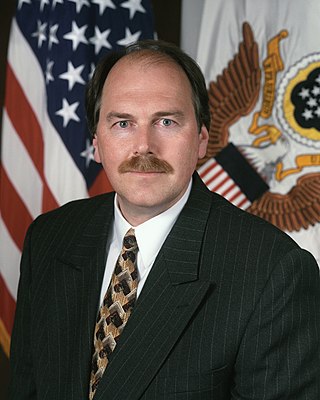Related Research Articles

The United States secretary of defense (SecDef) is the head of the United States Department of Defense, the executive department of the U.S. Armed Forces, and is a high ranking member of the federal cabinet. The secretary of defense's position of command and authority over the military is second only to that of the president of the United States, who is the commander-in-chief. This position corresponds to what is generally known as a defense minister in many other countries. The secretary of defense is appointed by the president with the advice and consent of the Senate, and is by custom a member of the Cabinet and by law a member of the National Security Council.

The National Security Act of 1947 was a law enacting major restructuring of the United States government's military and intelligence agencies following World War II. The majority of the provisions of the act took effect on September 18, 1947, the day after the Senate confirmed James Forrestal as the first secretary of defense.

Charles Jeremy Lewis was an American politician who was a U.S. representative, last serving California's 41st congressional district. He was first elected to Congress in 1978, and previously represented the 40th, 35th, and 37th districts. A Republican, he was chairman of the House Appropriations Committee, serving in that role during the 109th Congress. In January 2012 he announced that he was not running for re-election and would end his congressional career in January 2013.
The United States Navy Working Capital Fund (NWCF) is a branch of the family of United States Department of Defense (DoD) Working Capital Funds. The NWCF is a revolving fund, an account or fund that relies on sales revenue rather than direct Congressional appropriations to finance its operations. It is intended to generate adequate revenue to cover the full costs of its operations, and to finance the fund's continuing operations without fiscal year limitation. A revolving fund is intended to operate on a break-even basis over time; that is, it neither makes a profit nor incurs a loss.
The U.S. Senate Appropriations Subcommittee on Agriculture, Rural Development, Food and Drug Administration, and Related Agencies is one of twelve subcommittees of the U.S. Senate Committee on Appropriations. It was formerly known as the Subcommittee on Agriculture, Rural Development, and Related Services, but was renamed in 2007 to more accurately reflect the programs under its jurisdiction, and to more closely align the subcommittee with its counterpart on the House Appropriations Committee. The United States Senate Committee on Appropriations has joint jurisdiction with the United States House Committee on Appropriations over all appropriations bills in the United States Congress. Each committee has 12 matching subcommittees, each of which is tasked with working on one of the twelve annual regular appropriations bills. This subcommittee has jurisdiction over the budget for the United States Department of Agriculture, Rural Development, and the Food and Drug Administration.
The U.S. Senate Appropriations Subcommittee on Defense is one of twelve subcommittees of the U.S. Senate Committee on Appropriations. Military defense spending is the largest individual component of federal discretionary spending, making the Defense Subcommittee one of the more powerful Appropriations subcommittees. When referring to federal discretionary spending as a whole, many budget analysts make a distinction between defense and non-defense discretionary spending. The United States Senate Committee on Appropriations has joint jurisdiction with the United States House Committee on Appropriations over all appropriations bills in the United States Congress. Each committee has 12 matching subcommittees, each of which is tasked with working on one of the twelve annual regular appropriations bills.
The U.S. Senate Appropriations Subcommittee on Energy and Water Development is one of twelve subcommittees of the U.S. Senate Committee on Appropriations. The United States Senate Committee on Appropriations has joint jurisdiction with the United States House Committee on Appropriations over all appropriations bills in the United States Congress. Each committee has 12 matching subcommittees, each of which is tasked with working on one of the twelve annual regular appropriations bills.
The United States Senate Appropriations Subcommittee on State, Foreign Operations, and Related Programs is one of twelve subcommittees of the United States Senate Committee on Appropriations. The United States Senate Committee on Appropriations has joint jurisdiction with the United States House Committee on Appropriations over all appropriations bills in the United States Congress. Each committee has 12 matching subcommittees, each of which is tasked with working on one of the twelve annual regular appropriations bills.
The U.S. Senate Appropriations Subcommittee on Interior, Environment, and Related Agencies is one of twelve subcommittees of the U.S. Senate Committee on Appropriations. It was formerly known as the Subcommittee on Interior and Related Agencies, but was renamed to reflect its jurisdiction over funding for federal environmental programs, and to more closely align the subcommittee with its counterpart on the United States House Appropriations Committee. The United States Senate Committee on Appropriations has joint jurisdiction with the House Committee on Appropriations over all appropriations bills in the United States Congress. Each committee has 12 matching subcommittees, each of which is tasked with working on one of the twelve annual regular appropriations bills. This subcommittee has jurisdiction over the budget for the United States Department of the Interior and the United States Environmental Protection Agency.
The House Appropriations Subcommittee on Defense is a standing subcommittee within the United States House Committee on Appropriations. The United States House Committee on Appropriations has joint jurisdiction with the United States Senate Committee on Appropriations over all appropriations bills in the United States Congress. Each committee has 12 matching subcommittees, each of which is tasked with working on one of the twelve annual regular appropriations bills. This subcommittee has jurisdiction over the budget for the United States Department of Defense and United States Intelligence Community
The United States House Appropriations Subcommittee on Military Construction, Veterans Affairs, and Related Agencies is a standing committee of the U.S. House subcommittees and is within the United States House Committee on Appropriations. The United States House Committee on Appropriations has joint jurisdiction with the United States Senate Committee on Appropriations over all appropriations bills in the United States Congress. Each committee has 12 matching subcommittees, each of which is tasked with working on one of the twelve annual regular appropriations bills. This subcommittee has jurisdiction over the budget for Military Construction and the United States Department of Veterans Affairs.

Henry Lawrence Garrett III served as the 68th Secretary of the Navy from May 15, 1989, to June 26, 1992, in the administration of George H. W. Bush. Before leading the Department of the Navy, he served as General Counsel of the Department of Defense.
U.S. Senate Appropriations Subcommittee on Legislative Branch is one of twelve subcommittees of the U.S. Senate Committee on Appropriations. The United States Senate Committee on Appropriations has joint jurisdiction with the United States House Committee on Appropriations over all appropriations bills in the United States Congress. Each committee has 12 matching subcommittees, each of which is tasked with working on one of the twelve annual regular appropriations bills.
U.S. Senate Appropriations Subcommittee on Military Construction and Veterans Affairs is one of twelve subcommittees of the U.S. Senate Committee on Appropriations. The United States Senate Committee on Appropriations has joint jurisdiction with the United States House Committee on Appropriations over all appropriations bills in the United States Congress. Each committee has 12 matching subcommittees, each of which is tasked with working on one of the twelve annual regular appropriations bills.
United States Intelligence Community Oversight duties are shared by both the executive and legislative branches of the government. Oversight, in this case, is the supervision of intelligence agencies, and making them accountable for their actions. Generally oversight bodies look at the following general issues: following policymaker needs, the quality of analysis, operations, and legality of actions.

Gerald A. Cann was Assistant Secretary of the Navy in 1981 and the first Assistant Secretary of the Navy from 1990 to 1993.

Robert Michael "Mike" Walker is the former United States Under Secretary of the Army (1997-1998).

Gregory Robert Dahlberg was United States Under Secretary of the Army from 2000 to 2001.

The Carl Levin and Howard P. "Buck" McKeon National Defense Authorization Act for Fiscal Year 2015 was a National Defense Authorization Act. According to the House Armed Services Committee, which oversaw the legislation, the bill would be "the comprehensive legislation to authorize the budget authority of the Department of Defense and the national security programs of the Department of Energy." The total appropriations that are authorized amount to approximately $600 billion for fiscal year 2015.

Erik Kristopher Raven is an American political advisor who serves as United States under secretary of the Navy in the Biden administration.
References
- ↑ "FACA". www.facadatabase.gov. Retrieved 2022-07-05.
- ↑ Defense, United States Congress House Committee on Appropriations Subcommittee on Department of (2004). Department of Defense Appropriations for 2002: Hearings Before a Subcommittee of the Committee on Appropriations, House of Representatives, One Hundred Seventh Congress, First Session. U.S. Government Printing Office. p. 479.